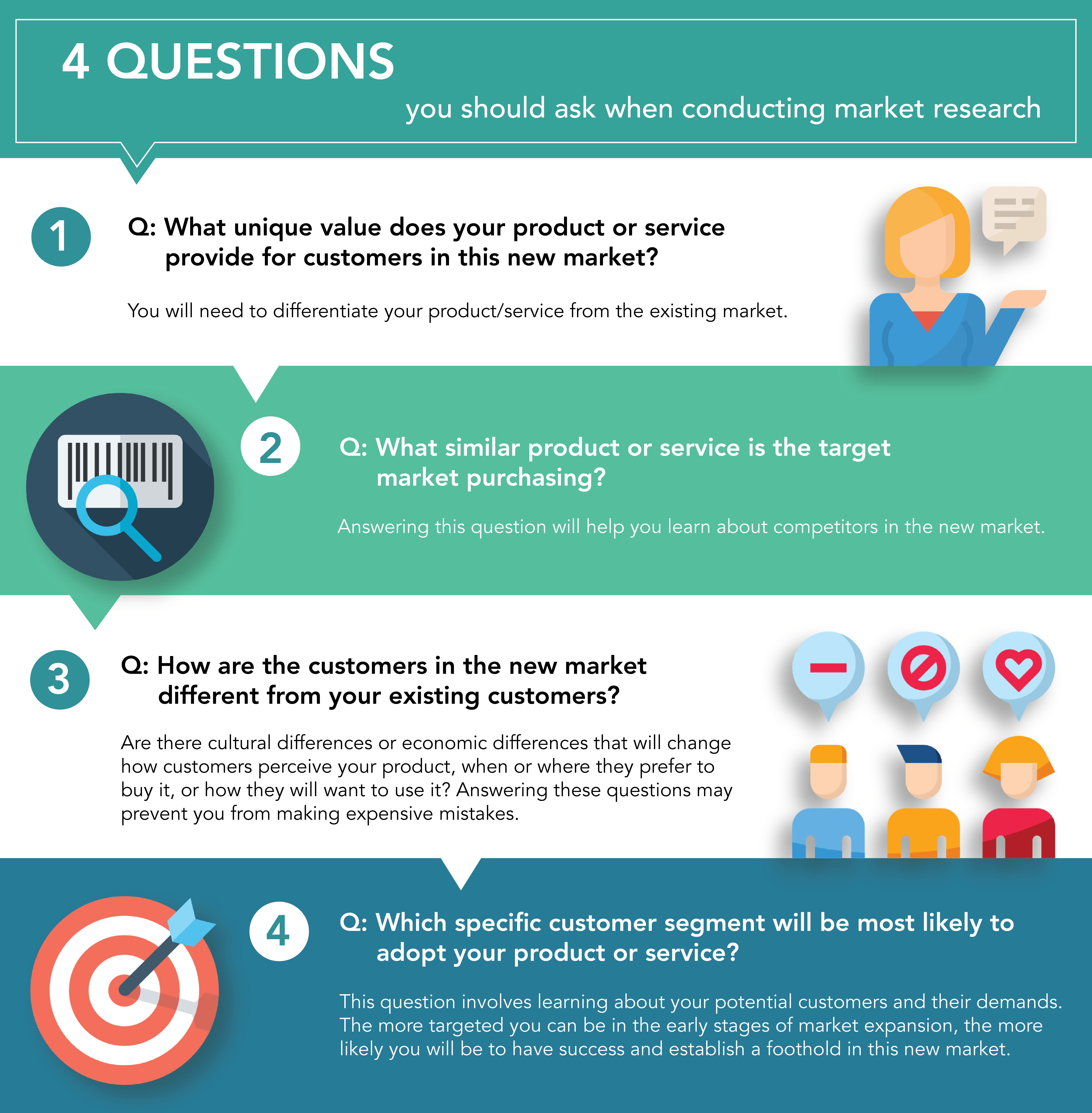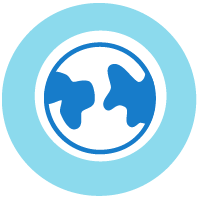Market Access and Exports

Do you want to develop your business internationally? Learning about market access and exporting will help you grow sustainably, and enhance your competitive edge.
The OECD, the WTO, and HKTDC provide overviews of Indonesia’s economy and trade policies in their websites.
Market Research
Should your business provide a new product or service to your existing customers? Or should you aim to enter a new market and find new customers? Market research will help you find the answers and make good decisions.
Market Research Questions

Surveying customers through mobile applications is a potential marketing research tool for MSMEs in Indonesia. Snapcart, as described in its own website, is a mobile application that gives shoppers cashback for scanning their receipts while Snapcart collects purchase data.
Identify Sales Channels in the New Market
 The Financial Times defines “sales channel” as a way in which a company supplies its products or services to customers.
The Financial Times defines “sales channel” as a way in which a company supplies its products or services to customers.
Keep in mind that even when you are successful with one sales channel in one market, that sales channel may fail when you expand into a new market. When expanding into a new market, you may have to try new sales channels as well. It may also take time to build relationships with distributors in the new market, so patience and persistence is important. Once your product has reached a level of proven success, you will be able to access new channels such as third-party distributors, value-added resellers, or large product expos and conferences.
Expanding into an international market for the first time is a challenge. You will need to know about tariffs and import-export laws, cultural differences, and differences in consumer preferences. It will be more difficult for you to do direct research, so online information resources related to your target market are essential.
Negotiating Contracts with International Partners
Principles of international business negotiation
- Learn and respect the business culture and the traditions of your international partners
- Understand the partner organization and the role of each person participating in negotiations
- Clearly identify negotiation goals, but be flexible on specifics when you can
- Consistently protect your own interests while maintaining and developing valuable relationships with partners
- Don’t approach negotiations as a fight or battle; instead, try to achieve collaboration and win-win solutions
Signing contracts with international partners
When negotiating with an international partner, make sure the contract language is airtight, particularly in the rights and obligations of the parties. Make sure the dispute settlement process is clear and doesn’t create a biased settlement process or legal trap for your business. Make sure that information or provisions to ensure payment are clear and specific. The contract should specify payment amounts and timelines, whether any delay in payment is allowable, and whether interest or fees will apply on delayed payments.
Hiring a lawyer who specializes in international contracts is always a good idea. It may be a large expense for a new company, but the lawyer’s expertise can prevent you from making mistakes that will cost far more money in the future. This is especially important if your international partner is a large corporation, as they have large legal teams for this purpose.
Customs Procedures
Importing in Indonesia
 To be legally importing in Indonesia, importers (who may be a person or company) are required to register with Indonesia’s trade department and obtain a customs identification number(Nomor Identitas Kepabeanan,NIK), a personal identification number given by the Directorate General of Customs and Excise.
To be legally importing in Indonesia, importers (who may be a person or company) are required to register with Indonesia’s trade department and obtain a customs identification number(Nomor Identitas Kepabeanan,NIK), a personal identification number given by the Directorate General of Customs and Excise.
Besides NIK, importers must obtain an Importer Identification Number (Angka Pengenal Import, API), which serves as a record in the database of importers and their import activities. All import activities are prohibited without the API.
Essentially, there are three types of import licenses available in Indonesia.
- API-U (General Import License)
- API-P (Producer Import License)
- Limited Import License, also known as API Terbatas (API-T)
These licenses are limited to a particular industry and do not permit the importation of goods not related to that sector of business.
Required Documents for Importers
Businesses importing into Indonesia must provide the following documents:
- Commercial invoice, signed by the manufacturer or supplier as true and correct
- Bill of lading, in three endorsed originals and four non-negotiable copies
- Certificate of insurance
- Packing list
- Import permit
- Customs import declaration
Exporting from Indonesia
Exporters too must first obtain a NIK to carry out export activities. In addition, exporting companies must already have a taxpayer identification number (NPWP) and one of the following business licenses:
- Trade license (SIUP) from the Ministry of Trade
- Manufacturing license from the Ministry of Industry, or other licenses issued by the relevant authority
- PMA license issued by the Investment Coordinating Board (BKPM)
- Exporter identification number (APE)
Required Documents for Exporters
Businesses exporting out of Indonesia must provide the following documents:
- Bill of Lading, Airway bill or other transport documents such as postal receipt, cargo receipt
- Commercial Invoice
- Customs Export Declaration
- Packing List
- Export declaration of goods (PEB)
- Insurance Certificate
- Export Permit
- Certificate of Origin
In some cases, it may also be necessary to provide the following
- Insurance
- Taxpayer ID number (NPWP)
- A quality statement or quality certificate
- Export LKP (Truth Examination Report), for products receiving Bapeksta facility or subject to PE (Export Tax) or PET (Export Supplemental Tax)
Importers and Exporters must note that the documents may have to be prepared in a special way to comply with the requirements of the import or export country. The required documents depend upon the nature of goods imported (general goods, personal effects, dangerous goods, and livestock among others), regular trade policy of Indonesia government, specific goods imported to Indonesia such as arms and ammunition, health products, food products, and chemicals.
Tariffs and Taxes
Indonesian customs use a tariff schedule based on the Harmonized Commodity Description and Coding System for classifying imported and exported goods, not originating from ASEAN member states. For goods arriving from ASEAN, Indonesia follows preferential rates available.
Import tariff and taxes
Customs duties in Indonesia vary from 0 to 170 percent, with most imported items attracting duties in the range of 0 to 15 percent. The amount of duty depends on the type of goods imported, based on the product’s HS code.
An import sales tax is imposed on imports at point of entry (except for those goods considered essential by the government) at rates within the range of 5 and 30 percent.
Further, Indonesia is committed to the ASEAN Free Trade Agreement within which duties on imports from the member countries generally range from zero to 5 percent, except for products specified on exclusion lists.
Export tariff and taxes
Exporters are exempted from export duties, VAT, and tax on luxury products for materials and intermediate products used in manufacturing goods produced from export. However, exports of certain items such as untreated skin, on white tanned leather and coal attract export duties of 25 percent, 15 percent, and 5 percent, respectively.
Free Trade Agreements
Signed free trade agreements:
Indonesia is a partner to the ASEAN Trade in Goods Agreement and a member of five regional free trade agreements (FTAs) through the ASEAN with:
- Australia
- China
- India
- Japan
- Korea
The country also has a separate bilateral FTA with Japan.
Unsigned free trade agreements:
According to ftavis.com, Indonesia is currently negotiating five additional trade agreements:
- Iceland, Liechtenstein, Norway, Switzerland, Indonesia
- South Korea, Indonesia
- Chile, Indonesia
- India, Indonesia
- Australia, Indonesia
Learning More
Market Access Map, developed by the International Trade Centre, is an online interactive tool based on a worldwide database of tariff rates, export-import statistics, tariff rate quotas, and market conditions. Using this tool, you can explore information on customs tariffs, trade barriers, and rules of origin you need to comply with to qualify for a preferential tariff rate.
Trade Map, developed by the International Trade Centre, is an online tool to help enterprises learn about strategic markets. It is free to use. Trade Map provides yearly trade data for 220 countries and territories and all 5,300 products of the Harmonized System defined at the two-, four-, or six-digit level. Users can search for international demand, alternative markets, and competitors. Trade Map provides information in the form of tables, graphs, and maps, and allows users to filter data by goods, country, product category, or national category.
